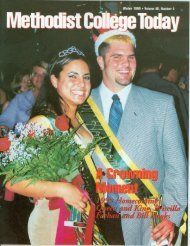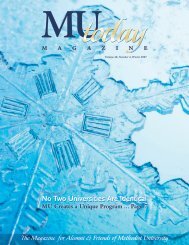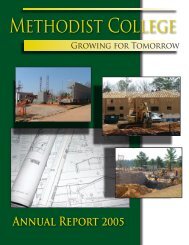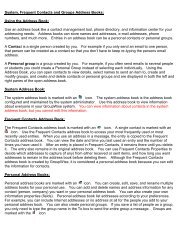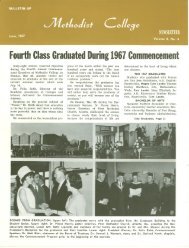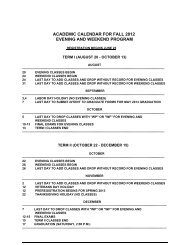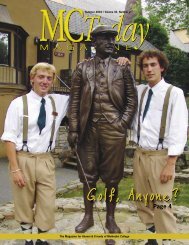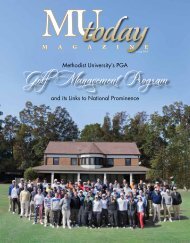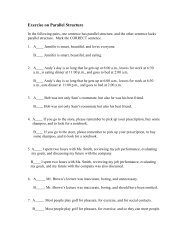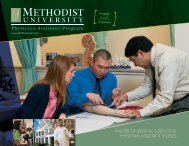to download the 2012-2013 Student - Methodist University
to download the 2012-2013 Student - Methodist University
to download the 2012-2013 Student - Methodist University
Create successful ePaper yourself
Turn your PDF publications into a flip-book with our unique Google optimized e-Paper software.
This written appeal will form <strong>the</strong> basis for a conference between <strong>the</strong> supervisor, <strong>the</strong> student, and <strong>the</strong> <strong>University</strong>official against whom <strong>the</strong> grievance is directed. The written appeal must state in detail <strong>the</strong> grievance andreasons for appealing and must be presented in four copies, one each for <strong>the</strong> supervisor, <strong>the</strong> official againstwhom <strong>the</strong> grievance is being made, <strong>the</strong> student bringing <strong>the</strong> grievance, and for <strong>the</strong> record. Since <strong>the</strong> documentis of primary importance, <strong>the</strong> student may seek assistance in preparing it for presentation. Any student ormember of <strong>the</strong> <strong>University</strong> community may assist <strong>the</strong> student in preparing <strong>the</strong> written appeal. The formal writtenprocess must begin within thirty (30) days of <strong>the</strong> most recent incident precipitating <strong>the</strong> grievance. Supportingdocumentation and/or evidence related <strong>to</strong> <strong>the</strong> precipitating incident, such as earlier documentation and/orevidence related <strong>to</strong> <strong>the</strong> precipitating incident, such as earlier incidents, may be included in <strong>the</strong> appeal. Thesame information, however, should also be available in <strong>the</strong> earlier stages of <strong>the</strong> grievance process.3. If <strong>the</strong> conference between <strong>the</strong> supervisor, <strong>the</strong> student, and <strong>the</strong> official against whom <strong>the</strong> grievanceis directed does not satisfac<strong>to</strong>rily resolve <strong>the</strong> issue, <strong>the</strong> student or <strong>the</strong> <strong>University</strong> official in questionmay request (using <strong>the</strong> same procedure as stated above) a conference with <strong>the</strong> authority on <strong>the</strong>next level of administrative supervision.4. If <strong>the</strong> conference with <strong>the</strong> administrative division head does not satisfac<strong>to</strong>rily resolve <strong>the</strong> issue,<strong>the</strong> student or <strong>the</strong> official against whom <strong>the</strong> grievance is directed may request <strong>the</strong> division head <strong>to</strong>convene an ad hoc Grievance Committee <strong>to</strong> hear <strong>the</strong> issue. The decision whe<strong>the</strong>r or not <strong>to</strong> convenean ad hoc Grievance Committee <strong>to</strong> fur<strong>the</strong>r hear <strong>the</strong> issue will rest with <strong>the</strong> appropriate administrativedivision head. In cases involving administrative division heads, <strong>the</strong> decision rests with <strong>the</strong> President.Decisions at this level will be final.5. The ad hoc Grievance Committee shall be composed of five (5) persons. The President shall nominatean administra<strong>to</strong>r <strong>to</strong> chair <strong>the</strong> committee, one additional administra<strong>to</strong>r and two faculty members. Astudent shall be nominated by <strong>the</strong> S.G.A. President.6. The Grievance Committee shall hear <strong>the</strong> testimony of both <strong>the</strong> student and <strong>the</strong> <strong>University</strong> officialand shall guarantee each <strong>the</strong> right <strong>to</strong> hear <strong>the</strong> o<strong>the</strong>r’s testimony. An audio tape shall be made of <strong>the</strong>hearing proceedings and shall be made available <strong>to</strong> both parties. If <strong>the</strong> student or <strong>the</strong> <strong>University</strong>official fails <strong>to</strong> appear at a scheduled session of <strong>the</strong> Committee, and fails within seven (7) days <strong>to</strong>provide a satisfac<strong>to</strong>ry explanation <strong>to</strong> <strong>the</strong> chairperson for <strong>the</strong> absence, that person shall be considered<strong>to</strong> have waived his/her right <strong>to</strong> fur<strong>the</strong>r consideration.The ruling of <strong>the</strong> Grievance Committee shall be final. During all formal proceedings, beginning with item #2of this procedure, both <strong>the</strong> <strong>University</strong> official and <strong>the</strong> student are entitled <strong>to</strong> <strong>the</strong> following due process rights:a. To be present at all formal hearingsb. To be represented by an advisor. Any party may seek from within <strong>the</strong> <strong>University</strong> community ofstudents, faculty, administra<strong>to</strong>rs, and staff a person who is willing <strong>to</strong> act as an advisor <strong>to</strong> assisthim/her. Lawyers may not represent parties in <strong>the</strong>se proceedings.c. To cross-examine witnesses.The records of <strong>the</strong> Committee shall be on file in <strong>the</strong> Office of <strong>the</strong> President for a period of five years.Only <strong>the</strong> President, <strong>the</strong> respective Vice President, and <strong>the</strong> Board of Trustees shall have access <strong>to</strong> <strong>the</strong>records. Members of <strong>the</strong> Committee shall observe strict confidentiality regarding <strong>the</strong> case.The entire formal proceeding, beginning with <strong>the</strong> written appeal <strong>to</strong> <strong>the</strong> supervisor, shall be completedwithin thirty (30) days.Academic Grievance ProcedureShould a student have a grievance which is academic in nature (i.e. with a particular faculty memberregarding a particular course, etc.), <strong>the</strong> student should complete a <strong>Methodist</strong> <strong>University</strong> AcademicGrievance Form. Forms can be obtained from <strong>the</strong> Registrar’s Office or from <strong>the</strong> <strong>Student</strong> Developmentand Services Office. Once <strong>the</strong> grievance form is completed by <strong>the</strong> student, it should be submitted first<strong>to</strong> <strong>the</strong> faculty member who taught <strong>the</strong> course, second <strong>to</strong> <strong>the</strong> Department Head, third <strong>to</strong> <strong>the</strong> DivisionDirec<strong>to</strong>r of <strong>the</strong> faculty member, and fourth <strong>to</strong> <strong>the</strong> Associate Academic Dean. If <strong>the</strong> student feels that<strong>the</strong> problem has not been resolved, he/she can appeal <strong>to</strong> <strong>the</strong> Academic Standards Committee of <strong>the</strong><strong>University</strong>. The committee <strong>the</strong>n makes a recommendation on <strong>the</strong> matter <strong>to</strong> <strong>the</strong> Vice President forAcademic Affairs. <strong>Student</strong>s who have questions regarding <strong>the</strong> Academic Grievance Procedure shouldcontact <strong>the</strong> Associate Dean for Academic Affairs. <strong>Student</strong>s’ academic complaints will not be heard unlessthis procedure is followed.23




